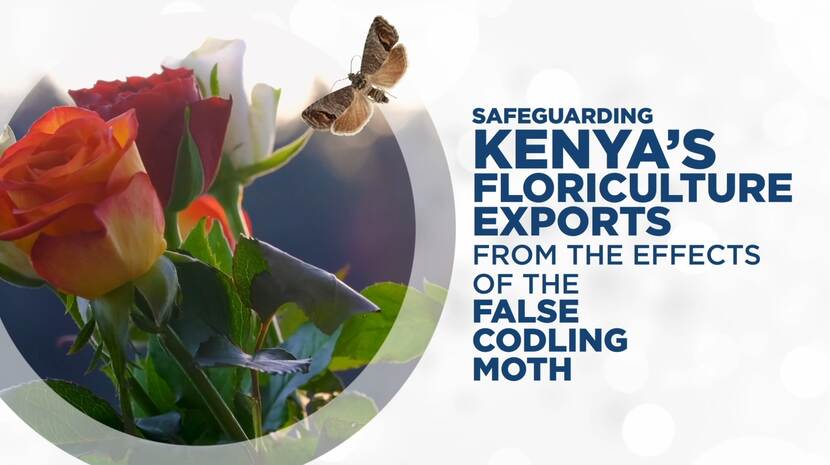Safeguarding Kenya’s floriculture exports from the effects of the False Codling Moth (FCM)
Kenya’s floriculture industry is a vital part of the economy, generating millions in revenue and providing jobs to thousands of people. As the top exporter of rose cut flowers to the European Union (EU), Kenya has nearly 40% market share, with most flowers sold through Dutch auctions. Despite this success, the sector is facing growing challenges, including new pests, pest population build-ups, stricter phytosanitary requirements from importing countries, and fewer pest control options due to limited chemicals allowed.
One of the biggest threats is the False Codling Moth (FCM), Thaumatotibia leucotreta, a pest native to sub-Saharan Africa that affects flowers, vegetables, and fruits. The moth lays between 100 and 800 eggs, and controlling it is difficult due to strict regulations on chemical usage. Following a Pest Risk Analysis by the European Plant Protection Organization (EPPO), FCM has been flagged as a high-risk pest for the EU, and is now classified as a regulated quarantine pest

In response, the EU has increased its inspections of Kenyan flower consignments. Back in 2018, only 5% of shipments were inspected. But starting May 1st, 2024, inspection levels have been increased to 25%, as outlined in the EU's official journal published on February 21st, 2024.
Moreover, a new regulation, EU Regulation 2024/2004, will come into effect on April 26th, 2025, further tightening the rules on pest management. These stricter regulations demand immediate action from Kenyan producers. Flower farms will need to invest in better pest control measures, improve monitoring, and comply with EU standards to avoid devastating impacts on their businesses and the entire industry. Failure to do so could jeopardize Kenya’s position as a top flower exporter and threaten the livelihoods of thousands of workers who depend on this sector.
To address this challenge, a collaborative approach is needed, hence the partnership between Kenya Plant Health Inspectorate Services (KEPHIS), with the Kenya Flower Council and the Kingdom of the Netherlands to roll out an intensive one-week training workshop across Kenya’s key flower growing regions, including Nairobi, Naivasha, Nakuru, and Timau. This aimed at equipping cut flower growers with the knowledge and tools needed to manage FCM more effectively.
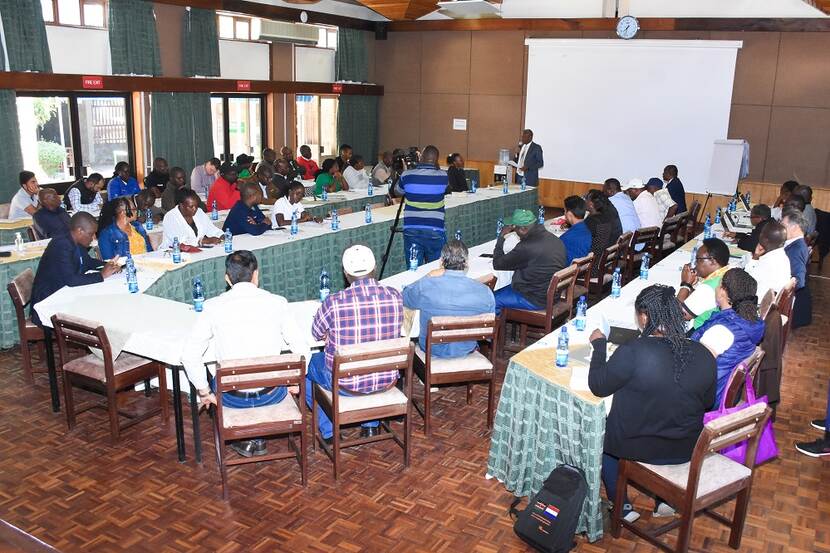
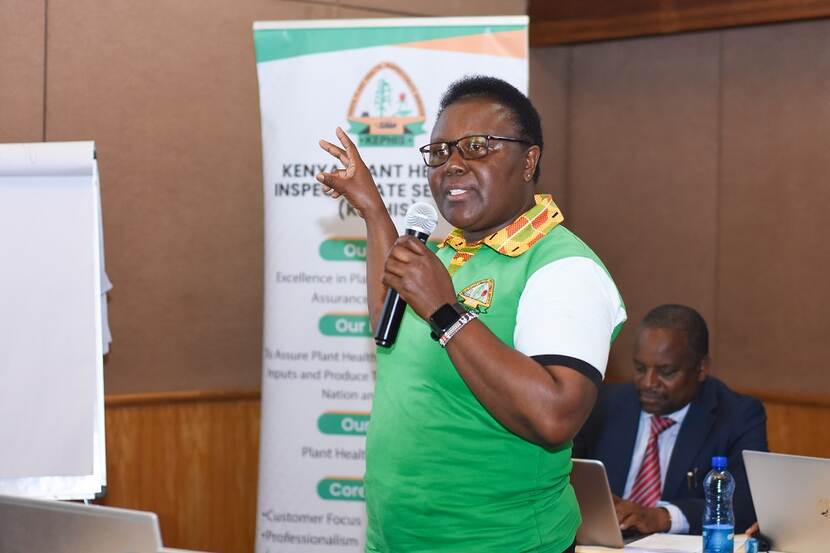
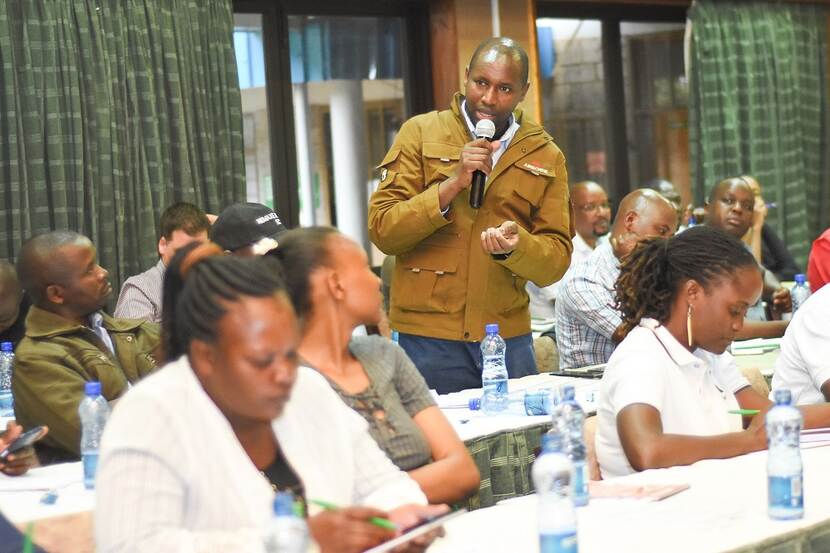
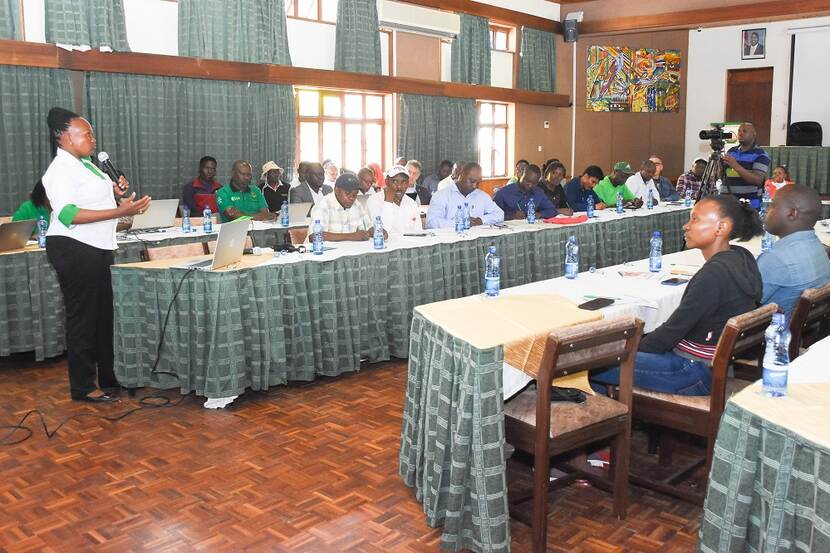
While representing Prof. Theophilus M. Mutui, Managing Director, KEPHIS during the official commencement of the training in Nairobi, Simon Mucheru Maina; Head, Seed Certification and Plant Variety Protection department – KEPHIS re-emphasized how the new regulations have a serious negative impact on business.
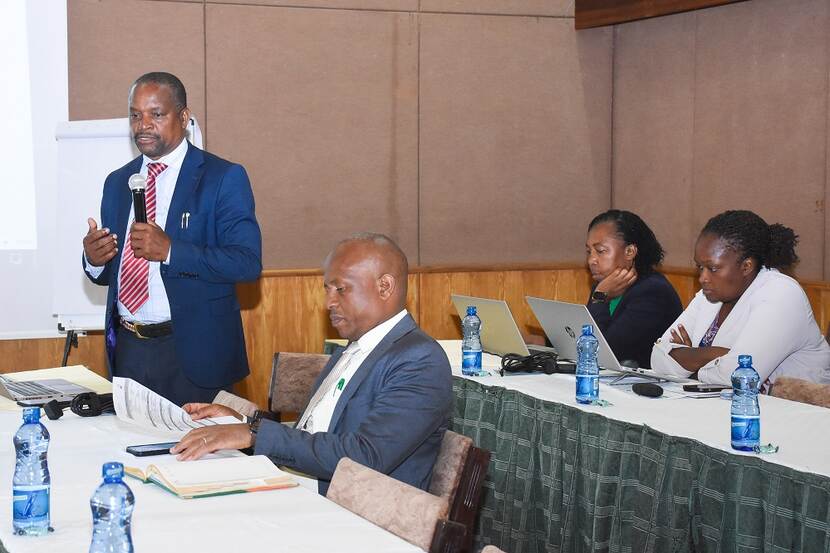
“The challenge ahead of us calls for a sober dialogue, strong collaboration, and working together, synergizing where we can and shedding those practices which did not work. We must think and act differently. Our market, the EU has clearly defined their requirement: “NO FCM and other Regulated pests in consignments being imported into the EU territory.” – Simon M. Maina, Head of Seed Certification and Plant Variety Protection department (KEPHIS)
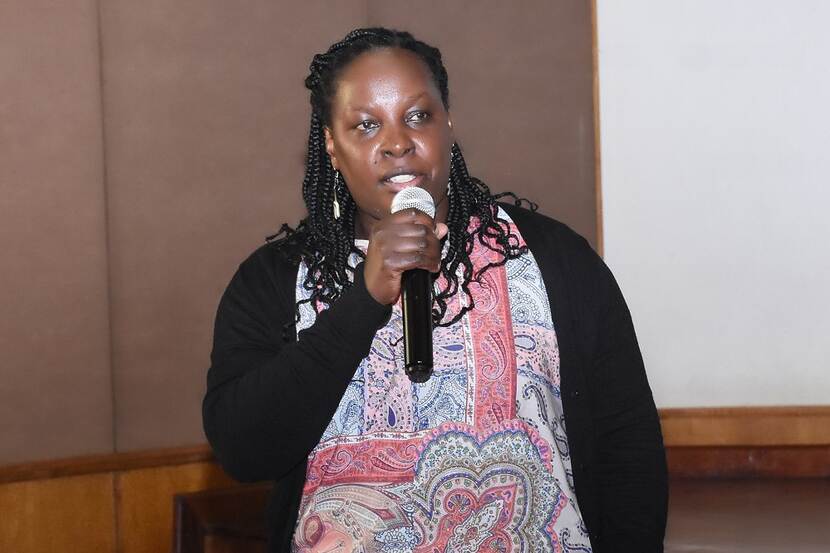
"Stakeholder collaboration underscores the global significance of Kenya’s floriculture sub-sector. As one of the major importers of Kenyan flowers, the Netherlands plays a critical role in ensuring that the flowers meet international standards for plant health. This partnership is not only beneficial for ensuring the smooth flow of trade but also highlights the importance of international cooperation in addressing pest control challenges” - Elizabeth Kiamba; Agricultural Advisor (Embassy of the Kingdom of The Netherlands Nairobi)
From research, KEPHIS has drafted an integrated approach, that (once revised and adapted) will work in addressing FCM. The systems approach integrates various methods; biological, cultural, mechanical, and chemical, that together provide a more sustainable and effective approach to pest control. The idea is to create a series of barriers, each reducing the likelihood of pests surviving and spreading. This approach is particularly effective for FCM because it considers the complexity of the moth’s lifecycle and targets different stages of its development, ultimately allowing for a more resilient and sustainable way of managing FCM. It is also important in ensuring compliance with international phytosanitary regulations, as it allows countries like Kenya to address pest issues holistically while minimizing environmental impact and resistance to control measures.
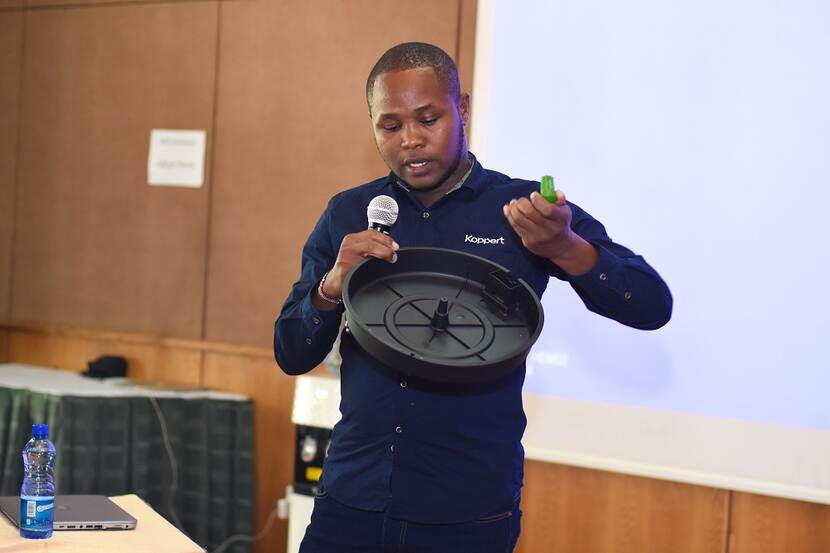
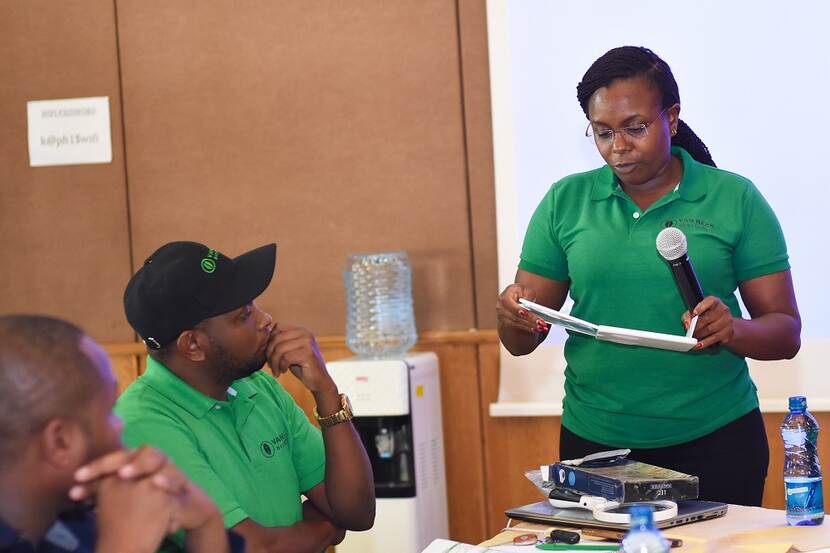
The systems approach incorporates several independent evaluation measures designed to ensure effective pest control and compliance with international standards. These include:
- Greenhouse integrity is crucial, focusing on maintaining well-structured facilities free of any damage, that limits pest entry and provides a controlled environment for flower production. Regular assessments of greenhouse conditions help identify potential vulnerabilities that could allow FCM infestations.
- Pest management includes monitoring techniques like pheromone traps that detect FCM presence early. This proactive approach allows for timely interventions before populations can grow and cause significant damage.
- Exit point inspections are conducted at export facilities to verify that shipments are free from pests, ensuring compliance with phytosanitary regulations set by importing countries, particularly in the European Union.
- Systems audits play a vital role in evaluating the overall effectiveness of pest management practices employed by flower farms. These audits assess adherence to best practices and help identify areas for improvement.
- Quality control at the packhouse involves rigorous inspections of flowers before packaging and shipping to guarantee that only pest-free products reach the market. By integrating these independent evaluation measures, the systems approach enhances the resilience of Kenya’s floriculture industry against FCM, safeguarding its reputation and ensuring continued access to global markets.
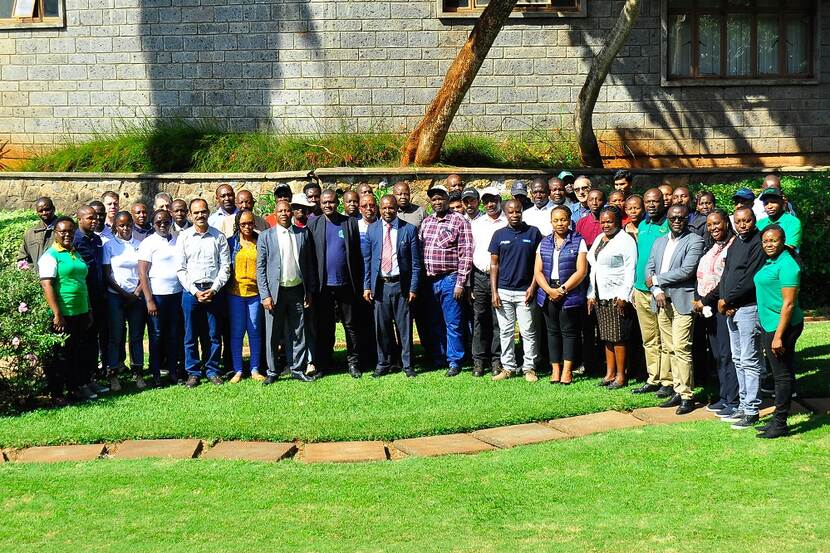
While adapting to global requirements may impose significant costs on producers, effectively addressing the False Codling Moth (FCM) challenge is critical for achieving inspection rates of less than 2%. This outcome will not only minimize interceptions but also facilitate smoother trade processes. With the April 26, 2025, deadline rapidly approaching, the success of these interventions relies heavily on the collaborative efforts of all stakeholders. By fostering open dialogue, exchanging best practices, and remaining adaptable to evolving challenges, Kenya's floriculture sector can preserve its hard-earned reputation, sustain its vital economic contributions, and protect the livelihoods of thousands who depend on this industry. The journey ahead demands urgency, commitment, innovative solutions, and cooperation to ensure a thriving future for Kenya's cut flower exports.

Wish to know more?
For more information about the trainings or the False Codling Moth or in case of questions for the Agricultural Counsellor feel free to contact us via NAI-LVVN@minbuza.nl.
You can always contact us when starting new businesses and partnerships which can contribute to improving agricultural productivity in Kenya. For the latest updates follow us on LinkedIn, Twitter (X) and/or register for our newsletter by sending an email to NAI-LVVN@minbuza.nl
